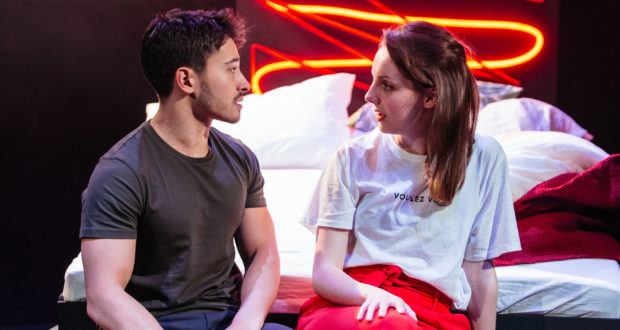Pros: Believable performances from all three actors, who also cope well with the more choreographed sequences.
Cons: Some of the flashbacks are confusing; a mention of an absent father also feels clichéd. An of-the-moment piece that feels true to the state of modern dating and intertwined issues around consent, truth and power.
Summary
Rating
Excellent
Love Me Now, Michelle Barnette’s debut play, sees an up-and-coming cast and crew address some of society’s most topical issues. How do you date as a free spirit without getting hurt? At what point do you reveal your flaws, or your intentions? When does casual become something more? And when is a line crossed? These questions don’t exclusively apply to Millennial daters, and they are more prevalent than ever thanks to the #MeToo movement calling out sexual harassment and inequality.
The characters are only named A, B and C, but their complex motivations and behaviours feel much more tangible. A (Alastair Toovey) is a muscular, libido-led 20-something, having casual sex with B (Helena Wilson), a woman who works hard, plays hard and pretends to do yoga ‘for the Instagram’, but would clearly love this no-strings situation to become a full relationship.
However, she isn’t just clutching at straws here. A – as she reminds him several times – told her way back when that “this can be whatever you want it to be”. But B doesn’t have control over what ‘this’ can be, as she has barely any autonomy in the quasi-relationship. A long-overdue confrontation ensues, veering between comedy and tragedy, as the audience is driven towards a shocking and disturbing moment between the pair.
Scenes are punctuated by a darkened stage, lit only by pulsating red tube lighting haphazardly arranged behind and above B’s bed. Simple but effective lighting and sound design pervades throughout, with distorted soundbites accompanying these darker moments. The lighting feels like a heartbeat, or perhaps the clenching of stomach muscles as things become more visceral on stage; A’s idea of a ‘joke’ darkens, and the dialogue probes deeper.
B’s conflicting emotions and her split-second decision-making is nailed by Wilson. The only issue with her character is a handful of references to an absent father which feels like a set-up for daddy issues, whereas A’s close and loving relationship with his mother contrasts with his taste for ‘disposable’ women.
B’s attempts to move on from the horrible mess with A brings us to the equally complex C (Giambruno Spena), an outwardly nice, if dull, intellectual. His shirt and grey V-neck jumper, rigid beliefs (“I don’t swear”) and awkward compliment-dropping are deliberately at odds with A’s casual clothes, throwaway insults (“You should have slept around”) and game-playing.
Yet Barnette doesn’t present C as a cookie-cutter Prince Charming, and B feels threatened by aspects of their cosy (and often downright funny) date with good reason, not least when C stops B talking with a gesture that makes the audience gasp. He may be the kind of boy your mother would love, but he’s also a prat. Whilst the issue of consent is so blatant between A and B, it bubbles under the surface between B and C, and there are signs that every future relationship of B’s will be affected.
Later scenes cut back and forth between A and B’s first meeting and painful recollections of the moment their relationship changed altogether. Whilst these flashbacks are stylistically exciting, it can take too long to realise where you are in the story.
Barnette is a theatre producer by trade, but her first play shows she has a lot to say, and now is the perfect time for everyone to listen to stories about consent, power and identity. If you can drag the A-type figures away from their Tinder scrolling, the B-type figures from their Instagram posing and the C-type figures away from their boring conversations over a bottle of wine, get them to the Tristan Bates Theatre. They could all learn a lot.
Author: Michelle Barnette
Director: Jamie Armitage
Producer: MBP/The Actors Centre
Booking Until: 14 April 2018
Box Office: 020 3841 6611
Booking Link: https://www.tristanbatestheatre.co.uk/whats-on/love-me-now
 Everything Theatre Reviews, interviews and news for theatre lovers, London and beyond
Everything Theatre Reviews, interviews and news for theatre lovers, London and beyond



